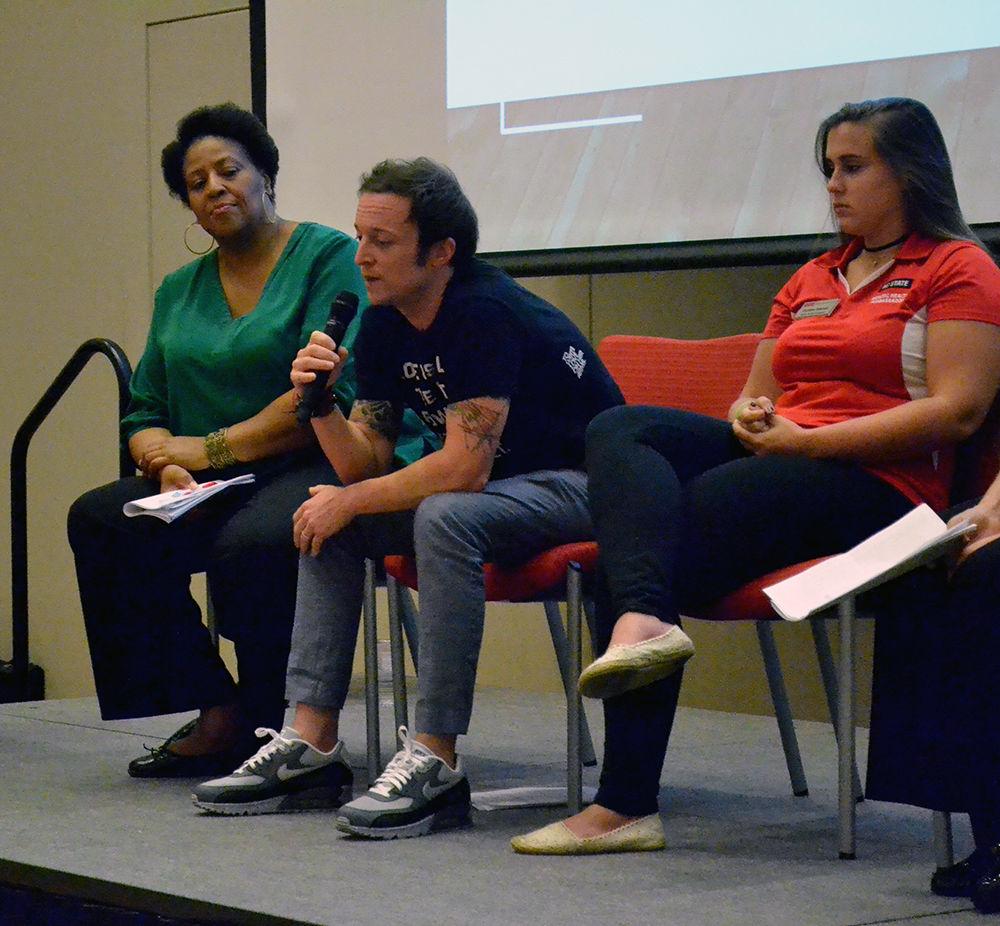
Sindy Huang
Drew Sykes, Lead Social Media Specialist at NC State, talks about his experience being counseled during the Mental Health Town Hall at Talley Student Union on Thursday, August 31, 2017. After losing a close friend three years ago, Sykes needed the urging of several friends to finally go to counseling.
The first Student Government town hall of the semester took place Thursday in Talley Student Union to bring awareness to the NC State’s Disability Services Office, the Counseling Center and the stigma around mental health on campus.
The Mental Health Town Hall was arranged by the University Affairs Department, which is led by Kelechi Kwazemem-Opara, a fourth-year studying electrical and computer engineering.
“The town hall meetings are kind of an avenue for students to learn about separate topics that are actually important to experience at NC State,” Kwazemem-Opara said. “For something like mental health, people suffer from different things and I feel like giving them an opportunity to learn and ask questions and be curious is nice. I try to make this a safe space for people to actually come and speakers to come and share their experiences with them.”
Student Body Vice President Mia Connell, a third-year studying sociology, moderated the Mental Health Town Hall and began by introducing the five speakers who were in attendance. The speakers included Maggie Faulkner, Monica Osburn, Stephanie Rubain, Caroline Peterson and Drew Sykes.
Maggie Faulkner, access consultant for the Disability Services Office on campus, discussed the center’s responsibilities, which include facilitating accommodation and services for students, meeting with students, determining eligibility and notifying professors. Faulkner included that the process for determining accommodation for students is discreet and confidential.
Monica Osburn, executive director of the Counseling Center, and Stephanie Rubain, interim assistant director for diversity and special programs at the Counseling Center, took to the podium after Faulkner. Osburn, who was named the American College Counseling Association Director of the Year for 2016, addressed important issues the Counseling Center and students face.
“Anxiety, stress, depression,” Osburn said. “Every year, year after year, they’re the top concerns. About one-third of the students we see have suicidal thoughts that we manage. We saw almost 5,000 last year … that’s a lot.”
Osburn mentions the growing success the Counseling Center has had with outreach programs to stop the stigma surrounding mental health, but that there is now a new struggle.
“I think we have done so much within the past few years to break down the stigma,” Osburn said. “You can really see that, at NC State, and also at a national level, that record number of students are actually coming in, and that’s great. Now it’s actually having the resources to support the students and what they need.”
Over the past year, the number of students accessing some form of help at the Counseling Center has risen 25 percent, totaling to 4,914 receiving treatment. The center considers itself as offering short-term treatment, and it refers students to other easy-to-access services around campus where they can feel comfortable.
Osburn also said that students are seen immediately by a clinician upon arrival to the Counseling Center if they are seeking help.
Caroline Peterson, President of National Alliance on Mental Illness and a Mental Health Ambassador, and Drew Skyes, a representative from NC State University Communications, both shared their own stories about why mental health is important to them.
Peterson, a fourth-year studying psychology, says her main focuses are on mental health and spreading the word about it.
“You’d be so surprised how many people don’t even know where [the Counseling Center] is,” Peterson said. “It’s on the second floor of Student Health by the way.”
Peterson also emphasized the importance of her position as a Mental Health Ambassador on campus and how she uses it to reach out to students on a more personal and connective level.
“The opportunities and the resources for [students] to get help are there,” Kwazemem-Opara said. “The more you learn about, even if it isn’t getting help for yourself, it’s about knowing and how to handle people around you that might need it.”
The next town hall will be held on Oct. 24 at 4 p.m. in Talley Student Union’s Piedmont Ballroom and will be focusing on sexual assault on campus.